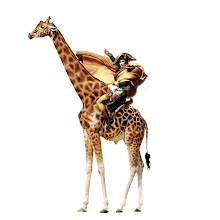I learned of bilocation from Pynchon's Against the Day. There were two professors who were actually the same person, only he was so divided, so conflicted, so much his own perfect opposite that he split apart into these halves, each forever competing against the other. I think many of us can relate.
But this says more, brings in time, youth, and the ever-growing checklist each keeps of his or her own failings and windfalls. I began to think about this in terms of myself, or perhaps myselves, and began to question just how many people I am. I'm not a religious person, which isn't saying I'm agnostic or athiest because I'm not either of those (even if it could be argued that I am by default). I simply don't care. But I began to consider bilocation as a religious vocation. Explanation is necessary.
Religion's largest power, in my view, is its command of death. Death is scary, but only if you don't think about it. If you do think about it, it's not so bad, and most dead people I know seem to be grateful for the rest. But religions console us with the idea of a final location, the ultimate home, Shambala, Shangri-Laa, heaven, countless virgins, reincarnation, seven levels of hell, the Brahman universe, nothingness/ultimate consciousness, it goes on and on, the afterlife is bustling, people. And you thought you were tired now. If you are extremely devout, I would argue that living is your break and death is clocking in. You know in heaven you never get to quit singing, right? Quite a lot of construction, too. But enough, the point is that religion offers a permanent HOME. Your very own home, where everything is great, perfect, and above all else, you are no longer conflicted. All questions answered, debts settled, bets off.
But wait a minute, it's death that does all that, not the afterlife. Death settles everything, at least for the lucky corpse. So we're just hoping (praying?) that death is somehow better than life, and specifically, we want to be alive again but with all of the comforts of death. This is where bilocation comes in.
I had started to notice that I was quite different at work than I was at home. I realized that somehow, on the 15 minute drive between each place, I would adopt an entirely different set of priorities and goals, separate mannerisms and vocabularies, and not just between work and home, but between home here and the place where I was born, between different sets of friends, certain restaurants, etc. until I finally asked, "Who are all these people?" So I started writing letters to myself from all of these different places to see which Chad had the answers, which one knew the most about me/himself/selves, and, this is the most important part, if any of them knew where the location was that I was one person, where was heaven. Was it at work? At home? In my room? At one point I thought it might be inside my computer, that seemed to be where all the action was taking place, but I got a reply back confirming I was merely writing letters to myself, although some were quite encouraging. And I started seeing this as something quasi-religious, a wandering ascetic sort of thing, and it seemed a much more viable alternative to bathing in the blood of a lamb, most anything does.
So where is the Original Location? When did I split? When will I be back together again? Is the answer in life or in death? And what about the parts of me that have died along the way? Did they find comfort in their death? Did I? Can they be revived to tell me, can they speak through photographs, should I have kept better records? The one glimmer I'm seeing in all this is that if each of me tithes I could buy a boat.
8.1.09
Subscribe to:
Post Comments (Atom)

No comments:
Post a Comment